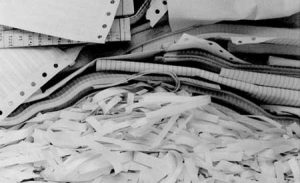The term ephemera refers to items, usually printed on paper, which are meant to have a very short life span. These may include tickets, bookmarks, advertisements, event posters, programs, menus, news clippings, business cards, handbills, pamphlets & brochures, greeting cards, invitations, labels, postcards, trading cards, photos, drawings, letters, stickers, and other paper objects of small size.
Promotional items such as matchbook covers, pens, and buttons are also considered ephemera.
Literary ephemera is that which is associated with literary figures or subjects. For example, it may be a handbill or poster for a poetry reading, a theatre ticket, book announcement, a bookmark or photo of an author.
Bookplates, when signed by an author and not attached to a book, are another type of literary ephemera. (We’ve written an illustrated article about bookplates which you may find interesting.)
Broadsides are sometimes considered ephemera as well, though the intent is most often for a broadside to have more than a limited life span.
Why collect ephemera?
Ephemera documents history, recording the small, and often subsequently lost, details of events, cultures and lives. These often lost & overlooked pieces of paper are bits of history in themselves.
Literary ephemera is a category often overlooked by book collectors. There’s a lot of it out there for you to find, but since some items exist in very small quantities, rarities are out there to be found. And, ephemera is usually relatively inexpensive, so it’s possible to build a collection even if you have a limited budget.
Another fun part of ephemera collecting is the element of surprise. While book collectors can collect every edition of every book an author has published, with ephemera collecting there’s no checklist to follow. It’s quite possible to discover an ephemeral item you never before knew existed.
Ways to collect
There are specialties available to the ephemera collector:
- ephemera of a particular type (i.e. bookmarks, posters, tickets, postcards)
- ephemera connected to a book
- ephemera connected to an author
- ephemera connected to an event or place (i.e. festival, city, university)
- ephemera connected to an era or group (i.e. Beat Generation, 1960s SF)
- ephemera connected to a publisher
- ephemera connected to a form or format (i.e. haiku, small-press poetry, adventure novels)
- …the possibilities are endless



